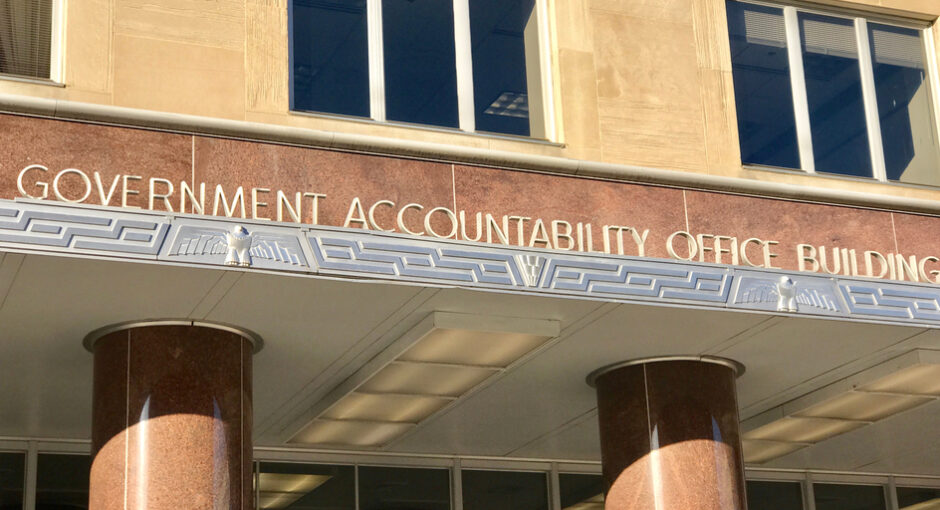A federal watchdog agency wants to know if 340B hospitals give low-income uninsured patients a break on drug prices at their contract and in-house pharmacies as part of the agency’s evaluation of a law that helps some hospitals forced out of 340B during the COVID-19 pandemic get their 340B eligibility back.
Why the U.S. Government Accountability Office (GAO) study is asking hospitals about sharing 340B drug savings with poor patients without insurance is unknown. Lowering what such patients pay for drugs is not a 340B program requirement (although many 340B covered entities say they do so). Nor is it a condition for a hospital to get its 340B eligibility restored through the end of this year under the new law.
Healthcare providers and the drug industry are fighting over whether manufacturers must honor providers’ 340B contract pharmacy arrangements. Some drug industry advocates, meanwhile, say 340B pricing should be available only on drugs given to low-income uninsured patients and that providers should have to pass along some or all of their 340B savings to such patients.
GAO is highly regarded and its findings on the degree to which hospitals share 340B savings with low-income uninsured patients at contract pharmacies would draw a lot of attention. Congress is expected to consider making big changes to 340B next year if Republicans become the majority party in the House, Senate, or both in November’s mid-term elections.
Richard Burr (N.C.), the Republican leader of the Senate Health, Education, Labor, and Pensions Committee, and Cathy McMorris Rodgers (Wash.), his counterpart on the House Energy and Commerce Committee, asked for the GAO study of the new 340B hospital eligibility law. Both would play lead roles in a future reshaping of 340B.
GAO confirmed the study’s existence in August.
GAO questionnaire preview
The questions about drug prices for low-income uninsured patients at 340B hospitals’ contract and in-house pharmacies is one of several on a Preview of GAO Questionnaire document that a 340B hospital recently got from the GAO. 340B Report obtained a copy.
In March, Congress passed and President Biden signed a spending bill with language to help hospitals whose admission patterns have been so disrupted by COVID-19 that their Medicare disproportionate share (DSH) adjustment percentages have fallen below the levels needed to stay in 340B. Reinstatement to 340B is not automatic; hospitals have to apply. The hospital must have been terminated from 340B due to being unable to meet the statutorily-required Medicare disproportionate share (DSH) adjustment percentage during Medicare cost reporting periods beginning October 1, 2019, and ending no later than December 31, 2022. Hospitals must attest that their DSH percentage fell below the 340B eligibility threshold for reasons related to the pandemic.
Bipartisan groups of House and Senate members sponsored bills that led to the language in the spending bill that became law in March. April 14 was the deadline for hospitals that had lost their eligibility to apply for reinstatement. The Health Resources and Services Administration (HRSA) said 48 applied. It declined to identify them. Some may lose their 340B eligibility again after Dec. 31.
The GAO study questionnaire preview document sent to hospitals says recipients should use it “to help determine the types of information you may need to gather for this questionnaire. Additional context and clarification will be provided in the questionnaire. Please feel free to share these questions as needed with any individuals who might assist with your hospital’s response.”
The document addresses these topics, in this order:
Medicare cost reports
GAO wants to know how each component of the hospital’s Medicare disproportionate share (DSH) adjustment percentage changed between the Medicare cost reporting period the hospital used to obtain its DSH percentage exception and the hospital’s Medicare cost reporting period for the preceding year.
Hospital’s 340B participation
GAO asks if the hospital experienced a lapse in 340B enrollment since the beginning of the pandemic due to not meeting the DSH percentage eligibility requirement. If the answer is yes, GAO asks the hospital to state the month and year the hospital was terminated from and reinstated to 340B.
The wording of the question could suggest that GAO is interviewing not just hospitals that lost their 340B eligibility during the pandemic and applied for reinstatement, but also a comparison group of hospitals that did not lose their eligibility.
340B drug costs
GAO asks the hospital for “the total dollar amount your hospital paid to purchase drugs through the 340B Program in fiscal year or calendar year 2020 and 2021” and “the total dollar amount your hospital would have paid to purchase these same drugs” at wholesale or group-purchasing price “if your hospital was not participating in the 340B Program” during those years.
Drug discounts at contract and in-house pharmacies
GAO asks if the hospital provides “low-income, uninsured patients with discounts on the drug price of some or all 340B drugs dispensed” at its contract pharmacies. It asks if hospitals for example gave patients drug discount cards or annotated electronic prescriptions showing that the patient is eligible for a discount.
GAO asks, “What is the drug price that low-income, uninsured patients are responsible for paying on 340B drugs dispensed at your hospital’s contract pharmacy(ies)?”
GAO likewise asks if the hospitals give such patients discounts at their in-house pharmacies and the price these patients are charged for 340B drugs.
“Other 340B Program benefits”
GAO asks, “Apart from any discounts on the cost of drugs your hospital provides to patients, what are other ways your hospital uses the 340B Program to benefit patients (e.g., providing or expanding programs or services for patients, providing charity or uncompensated care, etc.)?”
The document ends by inviting the hospital to give “any additional information you deem important to GAO’s study or anything else about your hospital’s participation in the 340B Program that you would like to share.”


